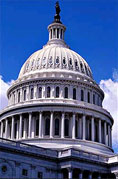
|
VoIP Debates to Determine Service's Fate in U.S.
By Joshua E. Barbach
July 14 concluded a six month period during which the foundations for VoIP's future were established. This includes several significant FCC rulings, as well as a major Notice of Proposed Rulemaking (NPRM), regarding the treatment of VoIP services. Congress has also been involved as various bills detailing VoIP deregulation have been proposed. The common thread among all of these efforts is the acknowledgement that the old regulatory structure for telephone services should not hinder VoIP's development.
Telecom vs Information Services
 Recent FCC rulings created a significant distinction between two different categories of IP-based voice services. February saw the FCC rule in favor of pulver.com's Free World Dialup (FWD) service. The FCC established precedent, declaring the peer-to-peer internet application an "information service" exempt from the common carrier regulations of "telecommunications service." One of the most critical elements is that Pulver provides no transmission capabilities to its members nor charges any fee for its FWD service. Recent FCC rulings created a significant distinction between two different categories of IP-based voice services. February saw the FCC rule in favor of pulver.com's Free World Dialup (FWD) service. The FCC established precedent, declaring the peer-to-peer internet application an "information service" exempt from the common carrier regulations of "telecommunications service." One of the most critical elements is that Pulver provides no transmission capabilities to its members nor charges any fee for its FWD service.
In contrast, the FCC ruled against AT&T's petition for a similar exemption from regulated charges. When a call reaches AT&T's network, it is converted into IP and transported over AT&T's Internet backbone. AT&T then converts the call back to POTS from IP and delivers it to the called party through local exchange carrier (LEC) business lines. The FCC emphasized that its ruling against AT&T is limited to this kind of IP-based interexchange service that: (1) uses ordinary customer premises equipment (CPE) with no enhanced functionality; (2) originates and terminates on the public switched telephone network (PSTN); and (3) undergoes no net protocol conversion and provides no enhanced functionality to end users as a result of the provider's use of IP technology.
Bills on the Senate and House Floor
In the midst of these FCC rulings, several bills regarding VoIP have been introduced in Congress. These include bills from Senator Sununu (R-NH), Representative Pickering (R-MS), and one from Representatives Stearns (R-FL) and Boucher (D-VA). The theme behind the three bills focuses on limiting regulation of VoIP. Sununu's bill, the VOIP Regulatory Freedom Act (S. 2281) is the most extreme and seeks significant exemptions for VoIP providers from CALEA obligations and access charges. However, calls that follow AT&T's protocol translation model - merely using IP for transport - would not be exempted from regulations.
Pickering's bill (H.R.4129) differs from Sununu's in that it doesn't prohibit other carriers from collecting access fees from VoIP providers. Furthermore, Pickering's bill would require VoIP providers to allow government investigators to intercept communications. Interestingly, both of these bills would limit the FCC's authority regarding VoIP, specifically restricting application of "telecommunications service" rules to VoIP. The Stearns-Boucher bill, the Advanced Internet Communications Services Act of 2004 (H.R. 4757), also offers restrictions to the FCC's authority. In this case, the bill limits FCC authority over VoIP services to E-911 issues, disability access, universal service funding and access fees when VoIP traffic intersects with the legacy telephone network. However, the bill specifically bars both the FCC and states from regulating the rates, charges or terms for any Internet-based voice, data, video or other form of communication that is sent or received over an IP architecture, no matter the provider.
Next » |
1 |
2 |
Subscribe
© 2004, All information contained herein is the sole property of Pipeline Publishing, LLC. Pipeline Publishing LLC reserves all rights and privileges regarding the use of this information. Any unauthorized use, such as copying, modifying, or reprinting, will be prosecuted under the fullest extent under the governing law.
|
 |



